We don’t pay much attention to our feet but they are a vital part of the body. Our feet help us get from point A to point B, and they help us stand upright. Without them, we wouldn’t be able to do different motor activities seamlessly so it’s only common sense that we take care of them and strengthen them. There are a lot of exercises we can do to achieve this. But, the better idea would be to allow our feet to move barefoot.
Walking barefoot is the most natural way to make our feet stronger. The problem is we can’t go barefoot round the clock. We can move barefoot at home all the time but we won’t be able to do this in our workplaces. It’s possible, however, for us to settle for the next best thing – wearing barefoot shoes.
What are barefoot shoes?

Barefoot shoes are kinds of footwear that allow the feet to move and function as if nothing is on. They don’t have all the extra features traditional shoes have but they do have a strong enough but still thin sole that protects the underfoot from the ground without sacrificing feedback.
Common Features of Barefoot Shoes
In the market today, you will find a lot of options when it comes to barefoot footwear. There are barefoot shoes for work and casual occasions. There are even barefoot shoes for kids to use while at the beach or playground. Though the choices are plentiful, all of the barefoot shoes you come across will have the following features:
- Zero Support
Traditional shoes have support features that alter the movement of our feet – a well-cushioned midsole, a padded tongue, a heel stabilizer, and so on. With barefoot shoes, there are no support features. The feet can move freely and naturally.
- Zero Drop
The drop of the shoe refers to the difference between the height and thickness of the midsole. Most shoes will have a 6mm but barefoot shoes, on the other hand, have zero drop meaning that they are completely flat.
- Thin Sole
The soles of barefoot shoes are thin to allow maximum ground feedback. The more a person feels the ground, the more his or her proprioception improves.
- Wide Toe Box
All barefoot shoes have a wide toe box to allow the toes to splay naturally. Common shoes have a narrower toe box. Although the narrowness doesn’t pinch the toes, it hinders them from spreading freely when moving.
- Flexibility
Flexibility is an important feature. Barefoot shoes allow feet to move freely and not hinder or restrict them.
Why are barefoot shoes better?

Did you know that the foot is made up of 26 bones, 30 joints, and over 100 muscles, tendons, and ligaments? Yes, it’s a complex structure with tiny parts working together to produce precise movements.
On average, we take about 10,000 steps per day, and with each step, our feet take on as much as 120% of our body weight. When running, it goes up to 275%. According to Dr. Emily Splichal, Podiatrist, as well as the CEO and Founder of Naboso Technology and the EBFA (Evidence Based Fitness Academy), she attributes most of the injuries she sees in her office to a “disconnect that is created between the body and the ground“. She associates these injuries to modern footwear.
This claim seems to have been confirmed by a study done by the American Podiatric Medical Association (APMA) where the results stated that 77% of Americans still experience foot pain despite all the bells and whistles common footwear has been designed to have. So, what seems to be the problem? It’s highly likely that most of today’s shoes are overdesigned.
Other studies that can confirm this claim:
- Children’s Shoes Cause Health Problems Later in Life for Adults
- The influence of footwear on the prevalence of flat foot
- Athletic footwear: unsafe due to perceptual illusions
Barefoot Shoes Benefits & How They Work

Walking barefoot benefits us in so many ways. It improves our awareness of our surroundings and even improves our balance. Also, when unshod, all the tiny parts in the foot work together in unison. The more these components of the foot are used, the stronger they become. Similarly, wearing barefoot shoes duplicate these benefits because they are designed to allow the feet to move freely.
Years ago, shoes were created to protect the feet from elements that could damage them. But, as time progressed, protection has become a lesser priority compared to fashion and style.
Based on a 2009 study, “the use of footwear remains necessary, especially on unnatural substrates, in athletics, and in some pathologies, but current data suggests that footwear that fails to respect natural foot shape and function will ultimately alter the morphology and the biomechanical behavior of the foot.”
Barefoot footwear is different because, as you know, they don’t have the “extras”. They have been stripped down of the unnecessary features and have been designed to go back to the basics so they can:
- Improve proprioception and balance
- Improve foot mechanics which can also result in better mechanics of body parts involved in moving
- Strengthen foot and leg muscles
- Enhance foot control
Other barefoot shoes benefits studies:
- Foot strike patterns and collision forces in habitually barefoot versus shod runners
- The long-term effect of minimalist shoes on running performance and injury: design of a randomised controlled trial
- Minimal footwear improves stability and physical function in middle-aged and older people compared to conventional shoes
- Barefoot running survey: Evidence from the field
Conclusion
Newer studies are coming out year after year citing numerous barefoot shoes benefits. There will be some cons to switching to barefoot shoes but there’s no doubt that the pros outweigh them.
Now, what’s next?

At this point, it might be pretty tempting to get your pair of barefoot shoes for work or daily use but it’s always a good idea to transition slowly. You have to acclimate your feet by walking barefoot, and you have to do calf and arch muscle stretches, for starters. Then, you can look for barefoot shoes that fit your needs. Try our shoe comparison guide to help you make the best choice.
You can also try our Minimalist AVR Score to rate the barefoot shoes you have been eyeing to purchase. The Minimalist AVR Score will help you recognize if a shoe is truly barefoot or minimal.
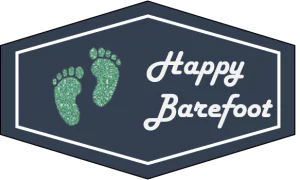






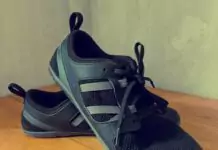

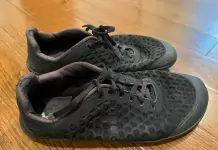

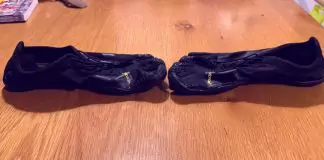


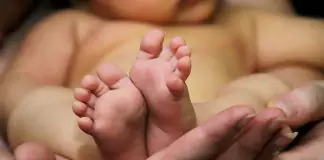






[…] Pabiona, M. (2021, August 24). Barefoot shoes benefits: Are they worth it? Happy Barefoot. https://happybarefoot.com/barefoot-shoes-benefits-are-they-worth-it/ […]
[…] jump on the trend of wearing barefoot shoes, thinking that they will be able to reap the benefits instantly. That’s not the case as transitioning incorrectly could cause […]
[…] you wean off wearing shoes and start walking barefoot, or at least use barefoot walking shoes then your feet will end up being way healthier. As time goes by, you grow accustomed to doing […]